- Home
- Sarah MacLean
The Rogue Not Taken Page 14
The Rogue Not Taken Read online
Page 14
Why, he was practically invisible to her.
She resumed her direction with new purpose. Approaching a portly gentleman manning the pub’s taps, she said, “I beg your pardon, sir, but I am searching for a messenger to carry a missive to London.”
The barkeep grunted.
She was not swayed. “I am able to pay quite handsomely.”
Mary had returned her purse yesterday, full to the brim with untouched funds. John had snatched it before the coach had been stopped. Thank heavens for the boy’s inappropriate habit, else Sophie would be without all her money.
Not her money. His money.
Guilt flared and she could not stop herself from looking to him across the room. He had opened a newspaper and was reading, as though she weren’t there. As though they’d never met. She quashed the guilt, vowing to reimburse every cent she used.
But desperate times and all that.
She returned to her barely-a-conversation with the barkeep. Lowered her voice. “Sirrah. I shall pay you and the messenger handsomely.”
He did not look at her, but replied. “Two quid.”
She blinked. “That’s an enormous amount of money.”
The barkeep shrugged one shoulder. “That’s what it costs.”
She waited for a moment, and then said, “I want a seat for the mail coach as well. North.”
He grunted. “Of course.”
“Gratis,” she said.
He blinked.
“Free,” she clarified.
He nodded. “Free.”
Well. At least there was that. She placed the coin on the bar, along with the sealed envelope. “And for two pounds, I expect the letter to arrive tomorrow.”
The man looked affronted. “Of course.”
She raised a brow. “I do apologize, sir. I should never have suggested that you might misappropriate my funds, as you seem very reliable and aboveboard.”
He did not hear the sarcasm in her words. “I am that.”
“Of course you are. When is the next coach to arrive?”
“There’s one due tomorrow.”
Excellent. She had no reason not to be on it.
She ignored the twinge in her shoulder, nearly as irritating as the knowledge that the man across the room cared not a bit for her presence. “I shall take a seat on it.”
The man reached beneath the counter and set a ticket on the bar. She pocketed the slip of paper and considered her next course of action.
“I’ve three questions.” The words came low and soft at her ear, sending a thrill through her.
She resisted the urge to lean into him. To look at him. “Oh. Hello, my lord.”
He raised a brow. “Hello.”
“You’ve decided to acknowledge my presence.”
“My lady, I assure you, were I not aware of you, I would most definitely not be lingering in Sprotbrough.”
Her lips flattened into a straight line. She was nothing more than a difficulty for him. Obviously. “What are your questions?”
“Why are you exchanging funds with the barkeep?”
She pushed past him to fetch a hard biscuit and a cup of tea from the sideboard, grateful that he wasn’t asking more questions about Robbie, who had somehow become her betrothed in the days since her being shot.
She should have told King the truth about Robbie. But damned if she didn’t want him to think her spoken for. To think her purposeful.
To think her desired.
To desire her himself.
She resisted the thought the moment it came. Good Lord. She did not wish him to desire her. She was not mad. She did not even enjoy his company. And he certainly did not enjoy hers.
She collected her plate and cup and turned to find him there, ready to guide her by the elbow to the table he had claimed, appointed with his own breakfast and what she had to imagine was a weeks-old newspaper. “Well?” he prompted when she sat. “The barkeep’s money?”
“Why do you care to know?”
“Husbandly curiosity.”
She sipped her tea. “Luckily for both of us, you have no claim on my business dealings, my lord.”
“No?” he asked casually, leaning back in his own chair. “With what money did you pay him?”
Sophie’s cheeks warmed. “Is that your second question?”
“Yes, but let’s call it rhetorical. I assume our pickpocketing young hero returned your purse and my funds?”
The already dry biscuit was like sand in her mouth. She swallowed and placed the purse on the table between them. “There are a few pounds missing,” she whispered, “I shall repay you.”
He did not touch the bag. “With what funds? My money is all you have.”
She leaned forward. “Not for long. The barkeep is sending a letter home to my father, apprising him of my situation and asking for funds.”
He leaned forward himself. “You think your father does not already seek you?”
“I cannot imagine why he would.”
Dark brows rose. “You cannot.”
She shook her head. “I’m not my sisters.”
“What does that mean?” If she didn’t know better, she’d think he was irritated.
“Only that they’re much more interesting than I. They’ll all marry well and make beautiful, wealthy children who will climb aristocratic trellises like wisteria.” She looked out the window. A team of oxen hauled a massive cart past, revealing a pair of dusty men hitching their horses on the opposite side of the street. “I am not a climber.” He watched her for a long moment, silent, until she felt she needed to add, “You see? I told you I wasn’t angling to marry you.”
“If I remember correctly, you told me you wouldn’t marry me if I were the last man in Christendom.”
“Harsh, but true, I’m afraid.”
“I’d ask why, but I’m afraid your honesty might wound me.” He sat back. “Care for a wager?”
“What kind of wager?”
“I wager your father seeks you already.”
She smiled. “I’m certain it’s not true. Matthew saw me into your carriage. My father knows I am well.”
King raised a brow. “At best, your father thinks I’ve ruined you.”
She shook her head. “Don’t worry about that. He’s a reasonable man who will understand everything when I explain it. You shan’t be saddled with a wife.”
“Oh, I don’t worry about being saddled with a wife.”
She considered the words. “I suppose you wouldn’t be. You’ve avoided marriage after ruination before.”
“It’s less avoiding than eschewing. I shall never marry. Angry fathers be damned.”
“Why not?” She couldn’t resist the question, but when his face darkened in reply, she instantly regretted it. “Never mind. I shouldn’t have asked that.”
After a pause, he said. “Your father seeks you already, my lady. That’s the wager.”
Triumph flared. Even if her father was looking for her, he would receive her missive tomorrow, and call off any search. She could not lose. She smiled, allowing herself to enjoy the moment. “I assure you, he does not. What do you forfeit when I win?”
“What would you like?”
“My bookshop. On the Mossband High Street.”
“Done. And when I win, I get a forfeit of my choosing.”
Her brows snapped together. “That seems a high price.”
“Higher than the cost of a bookshop?”
She tilted her head to one side. “I suppose not. All right. I agree.”
He smirked and reached over to steal a bit of her biscuit. “I will simply say, you’re a fool if you think your father hasn’t hired two dozen men to comb the English countryside and get you home.”
“I am going home,” she said.
“Home to London.”
“That’s just it. London isn’t my home.”
“And Mossband is?”
“Yes.” It must be. It was her only chance.
“You don’t r
emember it.”
“I remember it perfectly,” she insisted. “I remember the town square and the baker and the haberdasher and the livery. I remember the Maypole, festooned with ribbons, and the way that the summer days lingered as the sun set over the hills and the river. I remember that it was more beautiful and more interesting and more . . .” She searched for the word. “. . . honest than anything in London.”
“How romantic. Do you speak of the town? Or your betrothed?”
She narrowed her gaze, hating the way he mocked her and made her defensive, as though she didn’t know what she was doing or why.
As though she were being terribly rash.
As though she had a choice.
“In comparison to you and London, both.”
It wasn’t rashness that had her heading home. She had no choice. London would never have her. It never wanted her to begin with. She had to hope that Mossband would.
He finished his tea. “You know, considering you are whiling away your days in comfort abovestairs thanks to my largesse, Lady Sophie, one would think that you would be significantly better behaved in my presence.”
She faked a smile. “Sadly, my lord, I am not like the women with whom you typically consort.”
He reached for his newspaper. “You shan’t have an argument from me on that.”
He was odious. She huffed her irritation. “What’s the third?”
He looked up. “The third?”
“You said you had three questions.”
“Ah,” he said, looking back to the paper. “I do.”
“Well?”
“What the hell did you do to the Duke of Haven?”
Oh, dear. “How did you—” she began before realizing that the question acknowledged her actions. She changed tack. “I told you.”
He shook his head. “No. You told me you insulted him in front of the entire assembly.”
“I did,” she said.
He tossed the newspaper on top of her unpleasant biscuit. “What did you do before that, Sophie?”
She looked down at the paper, her gaze falling to a line of large, bold type. DANGEROUS DAUGHTER DUNKS DUKE!
It was not, as she had expected, an old newspaper. “That newspaper was printed and delivered with uncanny expediency to Sprotbrough.”
“Who would have imagined it was such a metropolis?” he replied.
“The exclamation point seems unnecessary,” she said quietly.
“You should write a letter of complaint to the editor. What did you do?”
She lifted the newspaper and offered it back to him. “I’m certain you can read all about it.”
“It says you nearly drowned him. There’s speculation that you wished to kill him.”
She rolled her eyes. “Oh, for heaven’s sake. He was backside first in two feet of fishpond.”
He laughed at that. A warm, rolling laugh that surprised her with its honesty. It made her wish he laughed more. It made her forget what they were discussing, until he recovered his words and asked, incredulous, “At your doing?”
“He deserved it, if that’s worth anything,” she grumbled.
“I have no doubt he did, the pompous ass,” Eversley said. “What did he do to you?”
“It wasn’t me,” she said. “I wouldn’t have done it if it were me.”
He watched her carefully. “For whom, then?”
“He was hidden away in the greenhouse. With a woman.”
“And?”
He was going to make her elaborate. “The woman was not my sister.”
“Ah,” he said.
And that was it. There was no judgment in the word. And at the same time, there was no understanding. “You don’t think he deserved it, after all.”
“I did not say that.”
“You did not not say it, either.” When he did not reply, irritation flared. “I suppose you’re all in some secret club, anyway.”
“We all?” he asked.
She narrowed her gaze on his. “Lotharios who don’t mind ruining marriages.”
“I told you, I don’t dally with married ladies.”
“Only soon-to-be-married ones.”
“There’s a difference.”
Every time she thought he was fairly decent, he reminded her of the truth. She tossed the paper at him. “No. There isn’t.” She paused, then added, “Lady Elizabeth, daughter of the Marquess of Twillery.”
“Sounds familiar.”
“She should. You ruined her planned marriage to the Earl of Exeter.”
“Ah. Yes. It’s coming back to me,” he said, relaxing into his chair.
“She married her father’s stable master.”
“Happily, if I recall.”
“She didn’t have a choice after you ended her engagement.”
“Love conquered. Isn’t that what is important?” He remained unruffled.
“Of course you can be flip about it,” she said. “You’re a man.”
“What does that have to do with it?”
“Your reputation is only enhanced by your actions. Poor Lady Elizabeth is ruined forever.”
“Lady Elizabeth might disagree with that assessment of the situation.” He returned his attention to the article in the paper about her altercation with Haven. “You are rather ruined yourself, it appears.”
“Those assembled were not amused.”
He smirked. “I don’t imagine they were. So, now we know.”
She looked to him in confusion. “What do we know?”
“What you’re running from.”
“I’m not running,” she insisted. “Either way, you needn’t trouble yourself with it; I have purchased a ticket on the mail coach tomorrow. I look forward to being rid of you, and I’m sure you feel the same.”
“You’re not going anywhere on a mail coach,” he said simply, as though she were asking his permission.
She shot him a look. “You’re acting like your name gives you some sort of special power over me. Again. I do not care for it.”
The words were punctuated by the door to the street opening behind her, Eversley’s gaze flickering over her shoulder to consider the newcomers as he turned the newspaper over. He tracked their movement for so long that she had to resist the desire to turn and look.
Instead, she leaned forward. “Don’t tell me it’s the real King?”
He cut her a look. “I suppose you think it’s amusing to mock my name?”
She smirked. “I do, rather.”
“You should not bite the hand that feeds you,” he said.
“Are you calling me a dog?”
“No,” he replied, “Hounds are more docile and obedient than you could ever be.”
She was about to tell him precisely which of them was houndlike when he reached for her hand across the tabletop as though it were the most normal thing in the world, looked deep into her eyes, and smiled.
Sophie’s breath caught. Good Lord, he was a beautiful man, all strength and power and that smile—it was no wonder that he was known for being a proper rake. It was almost enough to have Sophie forgetting that she disliked him and instead allowing him all sorts of liberties. Like holding her hand, for example. Her pulse quickened at the feeling of his warm skin against hers, and she at once regretted and rejoiced in the lack of gloves between them. She instantly attempted to remove her hand from his, keenly aware that even if they were married, the touch was inappropriate.
He held her like steel the moment she tried to move, and he spoke, the words loud enough for half the pub to hear. “I win, darling.”
Her brow furrowed. He won what? Darling? She leaned in. “Are you addled, sir?”
He smiled again, the expression full of privacy and promise, as though the two of them not only liked each other, but shared a lifetime of secrets. He lifted her hand to his lips, kissing the knuckles in succession. Sophie opened her mouth, then closed it, heart pounding, attention riveted to the place where his kisses rained.
What was ha
ppening?
“Apologies for the interruption.”
For a moment, she did not even hear the words, too focused on the strange, seductive man across the table. But Eversley heard enough for both of them, replying without moving his gaze from hers. “What is it?”
“We are looking for a missing girl.”
They were there for her.
Eversley’s grasp did not shift, and it was that firm, steady grip that kept her from gasping her surprise. She watched his eyes, read the question in them. Knew that he was leaving her the opportunity to reveal herself. She looked up at them, discovering the pair of dusty riders she’d noticed earlier. “A missing girl,” she said, clutching Eversley’s hand as though it were a port in the storm. “How terrible.”
Perhaps it wasn’t she.
The thought had barely formed before the man said, “Lady Sophie Talbot.”
She was found.
Her plans were thwarted. Eversley was right—her father had sent men to find her. They would ferret her back to London, to the bosom of her family, where she would be primped and preened and sent into Society at her great, mortal embarrassment.
She would have to become Sophie, the unfun Dangerous Daughter.
Days ago, that might have been fine . . . but now she knew there was another possibility. There was freedom. There was Mossband. There was even the possibility of Robbie, who might make good on his promise once he discovered that she was there, and marriageable. Perhaps he had been waiting for her all these years. Perhaps he had despaired for want of her.
Perhaps not.
There was Eversley.
Her gaze flickered to his and dropped away. With whom would she spar if these men took her into custody? Would she ever see him again?
Would she mind?
The answer whispered through her, and she hated even the thought of giving it voice. But there was no turning back. She’d had her chance for proper escape. For a simple, happy life, far from London and the future for which she’d never asked.
And it had been ruined.
Know when you’ve been bested, her father had schooled her again and again. Cut your losses. Shake hands. And return to destroy them another day.
The thought echoing through her, Sophie was quiet, gathering her courage. Ignoring the constant litany of Do not make me return that echoed in her head as the newcomer added, “She is believed to be traveling with the Marquess of Eversley.”

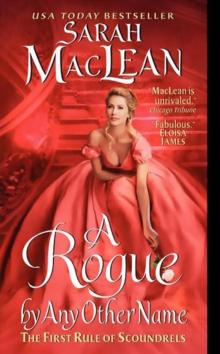 A Rogue by Any Other Name
A Rogue by Any Other Name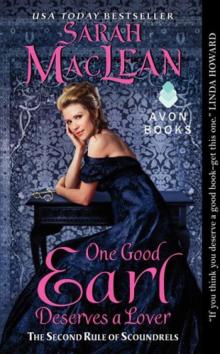 One Good Earl Deserves a Lover
One Good Earl Deserves a Lover Ten Ways to Be Adored When Landing a Lord
Ten Ways to Be Adored When Landing a Lord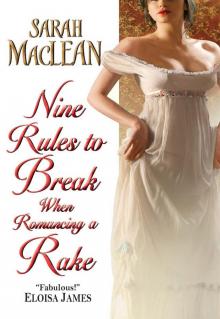 Nine Rules to Break When Romancing a Rake
Nine Rules to Break When Romancing a Rake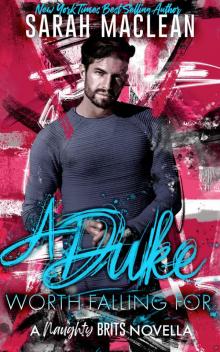 A Duke Worth Falling For
A Duke Worth Falling For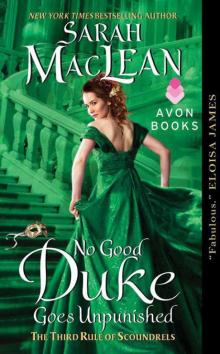 No Good Duke Goes Unpunished
No Good Duke Goes Unpunished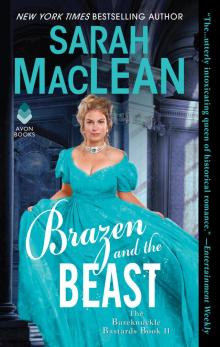 Brazen and the Beast
Brazen and the Beast Never Judge a Lady by Her Cover
Never Judge a Lady by Her Cover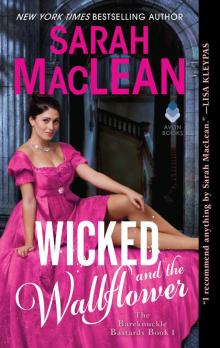 Wicked and the Wallflower
Wicked and the Wallflower The Rogue Not Taken
The Rogue Not Taken Bombshell
Bombshell A Scot in the Dark
A Scot in the Dark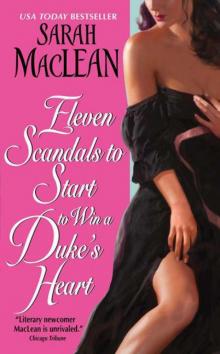 Eleven Scandals to Start to Win a Duke's Heart
Eleven Scandals to Start to Win a Duke's Heart Naughty Brits: An Anthology
Naughty Brits: An Anthology The Day of the Duchess
The Day of the Duchess Never Judge a Lady By Her Cover: Number 4 in series (The Rules of Scoundrels series)
Never Judge a Lady By Her Cover: Number 4 in series (The Rules of Scoundrels series)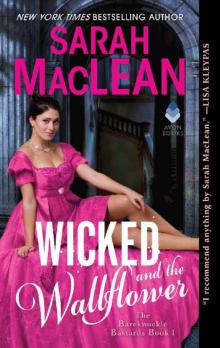 Wicked and the Wallflower: Bareknuckle Bastards Book 1
Wicked and the Wallflower: Bareknuckle Bastards Book 1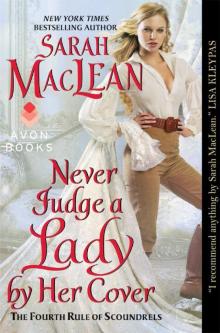 Never Judge a Lady by Her Cover_The Fourth Rule of Scoundrels
Never Judge a Lady by Her Cover_The Fourth Rule of Scoundrels